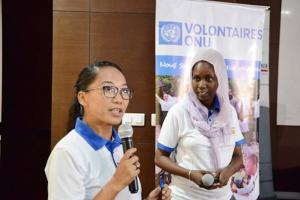Pioneer UN volunteers at WHO Regional Office for Africa
Today, 8 March 2020, the world is celebrating the International Women Day. The theme this year is "I am Generation Equality: Realizing Women’s Rights”. It is a call to address inequities. The World Health Organization (WHO) Regional Office for Africa committed to achieving gender parity among its staff. Women now account for 33% of WHO workforce, up from 27% in 2015.
WHO in the African Region is launching the Africa Young Women Champions Initiative in partnership with the UN Volunteers (UNV) programme. The initiative aims at recruiting 100 national and international UN volunteers in the African Region and will target young women from the global south to boost equity and empowerment.
Currently, 17 UNV, of whom seven are women, are serving at the WHO Regional Office for Africa in Brazzaville.
In 2016, Dolma Haraszti and Zara Hassan became the first UN Volunteers at the WHO Regional Office for Africa.
Ms Haraszti currently works for the UN Refugee Agency (UNHCR) in Niger as a Human Resource (HR) Officer. Her first international position was with WHO Regional Office for Africa as UN volunteer. She spent a year from October 2016 working as a Human Resource Assistant.
“I had the opportunity to be part of the HR team at the initial launch of the restructuring exercise in the context of the WHO transformation agenda. My tasks mainly concentrated around assisting the HR team in the recruitment and selection of staff across Africa.”
During an initial stint at UNHCR in Hungary, Ms Haraszti worked with UNV colleagues who were for her inspirational. Through them she was introduced to the UNV programme and develop an interest to be part of the UNV family.
“I understood that I was part of the pioneer UNV recruitment for WHO which leverage so much aspiration not only to demonstrate professionalism around my duty but also to set an exemplary reference for engagement of UNV at WHO,” she said.
After a year of UNV assignment, Ms Haraszti decided to look for an opportunity offering more responsibility. “Because I thought that the UNV experience had given me solid skills, and knowledge that help me to achieve the potential that I expire to fulfil.”
“For me, professional wise, this was my first international assignment, and it was the best decision I have taken to be part of the UNV programme because this has opened a wide spectrum of career opportunities for me.”
Ms Haraszti says she is very excited about the WHO’s Africa Young Women Champions Initiative in partnership with the UN Volunteers Programme. “I believe this is a brilliant commitment to allow women to explore experiences at home or internationally. Such an opportunity will be an encouragement to work harder but also a way to measure the capacity to strengthen the balance between private life and professional life.”
For Ms Hassan, working on different tasks while at WHO Regional Office for Africa gave her valuable experience. She was initially assigned to the human resource department. Then later worked in the Health Systems and Services Department as programme assistant when her term was extended.
Soon after she was deployed to the WHO Ebola response team in the Democratic Republic of the Congo (DRC). She says that she was fortunate “to be in the field serving where needed most.”
“I felt that I had more responsibility, not only as a UNV but also as a member of the institution I was serving – WHO Regional Office for Africa,” says Ms Hassan, a national of Chad.
“My mission in the DRC was the most challenging experience I have ever had, but I never hesitated about it and I was able to be part of the emergency response team, where I could value everyone’s contribution and learn from others.”
“Throughout my assignment I did everything … from analysing UNV profiles for certain positions, to participate in high-level meetings in Japan, to support the emergency response team in DRC”.
“We need more women within the UN agencies, not just to (increase) the quota … but rather in positions of responsibility. UNV opens doors to new horizons and we need to keep up on our efforts for a more inclusive and more effective development…,” she says.
Ms Hassan is currently specializing in Public Health at University Claude Bernard Lyon 1.
Chargée de communication en appui aux pays francophones
Bureau régional Afrique de l’OMS
Email : asekpon [at] who.int (asekpon[at]who[dot]int)
WHO Regional Office for Africa
Acting Regional Communications Manager
Email: ottob [at] who.int (ottob[at]who[dot]int)



